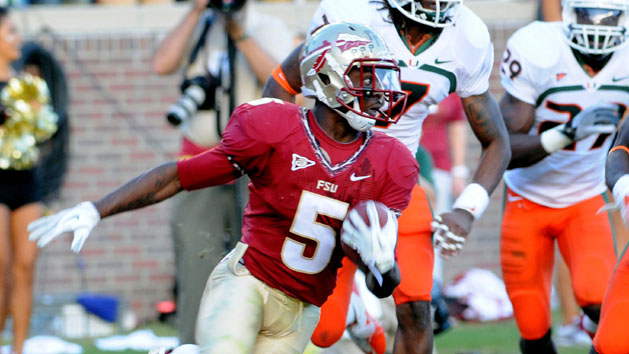
Are coaches beginning to send a message to players that bad behavior will not be tolerated? In the past few days, Florida State’s Greg Reid, Arkansas State’s Michael Dyer, Auburn’s Zeke Pike and Georgia’s Isaiah Crowell have been suspended permanently from their teams for various reasons.
It might be a refreshing trend to see coaches sending players packing after getting fed up with irresponsible behavior. There comes a time when the onus is on the player regardless of how much talent they posses. It’s called growing up and taking responsibility for your behavior.
These are positive decisions for coaches in two ways. The first: the coach rids his team of a persistent problem child. Second: the message to other players is if the coach will get rid of anyone if he is willing to get rid of a star player.
Hopefully when Dyer is working at the local fast food restaurant, he will realize just what he has blown. He has been dismissed from Auburn and Arkansas State.
Dyer gained 2,000-plus yards his first two seasons at Auburn and logically needed another big season at Arkansas State in order to turn pro. He is rumored to be possibly sitting out this season and trying to get into the NFL’s supplemental draft. Dyer has cost himself a lot of money in the future due to his antics.
FALL CAMP IS HERE:
There is something special about the beginning of fall camp. By the end of the week every team in the SEC and several in the ACC will be on the field, hopefully minimizing the painful headlines of a difficult offseason. Remember, it doesn’t matter who starts first because every team will have the same amount of practices. We will have more information about the teams by the end of the week than we had over the past several months.
ON PAR WITH THE ROSE BOWL:
The guess here is that the folks in the Big Ten and Pac- 12 offices were not real pleased to hear that the yet-to-be played Champions Bowl will make the same amount of money ($80 million) as the Rose Bowl, which has been playing since 1902. That is due to the alliance of the SEC and the Big 12, the two most powerful conferences in college football.
SCOTT A DIFFERENCE MAKER:
Pac-12 commissioner Larry Scott is going to be the next power broker leader in college football over the next few years, especially after Big Ten commissioner Jim Delaney and SEC commissioner Mike Slive retire.
Scott has already made an impact on the league. He is looking overseas to see how his conference can expand into markets such as China. Scott also has the persuasiveness to move his fellow commissioners to expand to an eight-game playoff if he chooses to do so.
SPURRIER COCKY:
Why is South Carolina coach Steve Spurrier picking on Ole Miss coach Hugh Freeze? Spurrier has already made two jabs at Freeze; once during SEC Media Days when he replied to a schedule question that he would prefer Georgia to play LSU while his team plays Ole Miss.
More recently when asked if he was going to recruit Penn State players, Spurrier said he did not feel the need to pursue Nittany Lion players, but Freeze does because Ole Miss needs players. Don’t expect the two to exchange Christmas cards. They also play each other in 2013. What this really means is that Spurrier knows he has a really good team so he is a bit more confident than usual.
TWELVETH GAME ANNIVERSARY:
Jon Solomon of the Birmingham News is one of the most creative writers in the nation. He had an interesting article recently on the anniversary of the 12th game, which was added to the regular season schedule seven years ago.
The 12th game was added to provide another revenue stream and hopefully give fans another exciting non-conference game. As Solomon’s research showed, since the 12th game started in 2006, the Pac-12 (with nine league games) has produced the most challenging non-conference schedule. Forty-five percent of the Pac-12’s non-conference games have come against BCS-conference opponents, just ahead of the ACC (43 percent).
The SEC has played 29 percent of its non-conference schedule against BCS schools. That’s in the neighborhood of the Big 12 (28 percent) and Big Ten (30 percent).
Not surprisingly, the SEC has lived up to its stay-at-home reputation, which is worth millions of dollars by playing an extra home game. Since 2006, the SEC has played only 17 percent of its non-conference games at opposing campuses. True road games for other leagues are: Big Ten, 22 percent; Big 12, 25 percent; ACC, 29 percent; Pac-12, 33 percent.
Brent Beaird writes for www.lindyssports.com and Gator Bait magazine. He can be heard on 1010XL sports radio in Jacksonville, Florida. Brent, who is a Heisman Trophy voter, can be contacted at [email protected] and on twitter @brentbeaird
